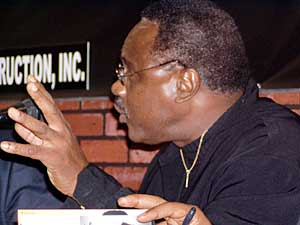|
Photos
More from MPR
Your Voice
|
Who speaks for Minneapolis' African American community?
October 31, 2003
A group of outspoken African American activists lead an anti-police brutality rally in downtown Minneapolis Friday. In the last few weeks, the activists' tactics have been criticized by African American and white city officials, who questioned whether they actually speak for the city's black community. Some say the controversy is typical of how race and class complicate the African American struggle for political power.
Minneapolis, Minn. — The question of who represents the black community came to the fore several weeks ago, when members of the Coalition of Black Churches and African American Leadership Summit filed a lawsuit to prevent the appointment of David Jennings as the head of Minneapolis Public Schools.
Jennings backed down from the position because of the controversy. In response, Jennings' supporters questioned the groups' authority to speak for the black community.
And that is what particularly angers the Rev. Randy Staten.
|
They'd like to say, 'Well, you know, that's just a handful of niggers out there. Just a handful of them. And they don't represent nobody. They ain't doin' nothing.
- Rev. Randy Staten, head of the Coalition of Black Churches |
"They'd like to say, 'Well, you know, that's just a handful of niggers out there. Just a handful of them. And they don't represent nobody. They ain't doin' nothing,'" says Staten. "Well, that's just the most insane thing in the world."
Rev. Staten is the head of the Coalition of Black Churches and serves as an official spokesman for the African American Leadership Summit. On most Tuesday mornings he can be found at Lucille's Kitchen, as a guest on "Conversations with Al McFarlane."
The 90-minute forum is broadcast from the north Minneapolis soul food restaurant on KMOJ radio. Staten considers the criticisms of his group as nothing short of an attack on the black community.
"We are at war. If you look all around us, we are at war," Staten says. "We've got cuts occurring everywhere. We got a retreat on civil and human rights. We have a war on black folk with police profiling. We're at war".
Staten's words have the ring of sensationalism to some, but to others, the rhetoric matches the issues.
"Some of these approaches to leadership and strategic maneuver are very much tied to specific historical situations," says Prof. John Wright, who teaches in the African American Studies program at the University of Minnesota.
Wright says the people who speak for the community are usually the ones who offer the appropriate response to a crisis. African Americans in Minnesota, compared to most racial and ethnic groups, earn less money, are in poorer health, are more likely to be unemployed, perform worse in school, and are more likely to be arrested and imprisoned. Recently, a black man accused Minneapolis police officers of sexually assaulting him.
"Certainly there's a well-established and a justifiable view on the part of some organizations that the only way to move the power structure at large is through vigorous, militant protest," says Wright.
However, Wright says there are other factors which help determine who speaks for the community. As in many cities across the country, members of the black middle class have moved out of the inner city of Minneapolis. Wright says their departure has left a power void. The void has been filled by people and institutions that remain, like black churches.
 | |||
Don Samuels is one of two African Americans on the Minneapolis City Council. He represents an inner city neighborhood in north Minneapolis. Samuels says there wouldn't be a need for groups like Staten's if more black middle class people brought their money, values and political clout to neighborhoods like his.
"We need some enfranchised black people coming into the community -- taking leadership of the community by the standards of living they will insist on," says Samuels. "Only we can do it."
Wendell Westbrook is the kind of person Samuels is talking about. Westbrook has lived in north Minneapolis for nearly 50 years. He says he's heard a lot of the same complaints about discrimination and police brutality for as long as he can remember. Westbrook says for the most part, people like him aren't usually the ones who have those kinds of problems, so they remain quiet.
"We've lived here all these years," says Westbrook. "We've certainly been involved in the school and in some of the community organizations, but there should be a lot more of that. And it's part our fault, too."
The rally and march against police brutality will start in two locations -- one in north Minneapolis, and the other in south Minneapolis. The two groups will meet downtown outside the federal courthouse.
|
News Headlines
|
Related Subjects
|

